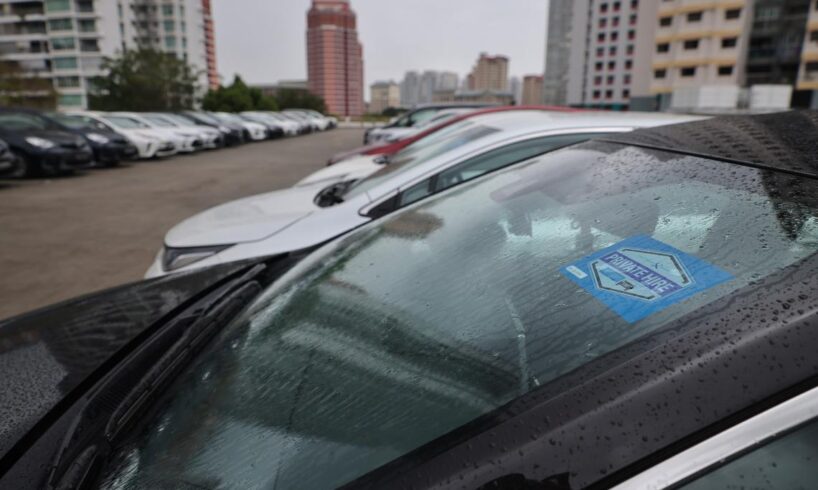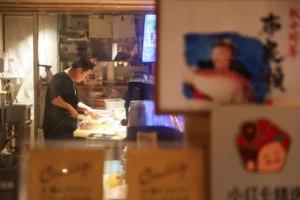
SINGAPORE – Some private-hire car drivers are calling for measures such as a review of base fares as a more concrete step to tackling the issues they face, after a work group formed by the Government rolled out 10 recommendations to protect the livelihoods of local platform workers on Sept 11.
The group’s recommendations
also champion fairer, safer and more transparent payment structures and incentive schemes for around 67,600 regular platform workers, including private-hire car drivers and delivery riders.
The group urged platform operators to work with platform work associations to develop a set of industrywide principles for issues related to payment or incentive schemes, or both.
Platform workers said this was a positive step forward, but more needs to be done.
Private-hire car driver Kelvin Lam, 50, said raising base fares would have a more immediate impact on driver safety and welfare, and prevent drivers from spending long hours on the road and running into health issues.
“Our operating costs have gone up (in the last few years)… but the base fares have not gone up since June 2021,” said Mr Lam, who has been a full-time Grab driver for eight years.
“With a 10 per cent increase (in the base fare), for example, drivers can hit their target and go home earlier, and they don’t have to slog through 14 to 15 hours,” said Mr Lam.
In May, a 49-year-old private-hire driver died from a stroke, having clocked 15-hour days to support his family.
Platform workers have for some time raised concerns over opaque payment and incentive schemes, causing them to work long hours for an uncertain income.
Ms Katherine Lim, who has been a driver for the past six years with platforms such as Grab and Tada, said she is glad the Government has noted the concerns of drivers and is serious about helping them.
Ms Lim, who drives for nine or 10 hours a day, said that while the cost of operating a private-hire vehicle has gone up, incentives have decreased.
“If I stop, that’s it; I have no salary. We want to look after our health and safety, but if the fares we are getting are much lower, where is the balance?” the 64-year-old asked.
Ms Lim also called for base fares to be raised, so that drivers can take home more.
Formed in July
to tackle the challenges faced by platform workers, the trilateral work group comprises the Ministry of Manpower (MOM), Ministry of Transport, National Trades Union Congress and ride-hailing platform Grab.
The group was led by Senior Minister of State for Manpower Koh Poh Koon, Senior Minister of State for Transport Sun Xueling, NTUC secretary-general Ng Chee Meng and Grab group managing director of operations Yee Wee Tang.
Platform work associations such as the National Private Hire Vehicles Association (NPHVA) and the National Taxi Association (NTA) said they will use the work group’s recommendations to draw up industrywide principles as the basis to discuss the transparency of earnings.
Mr Raven Lee, NPHVA’s executive secretary, said he would use the group’s recommendations to steer discussions with platform operators, including on fare structures, incentives and work allocation, among other issues, to improve the experience of platform workers.
NTA said the group’s suggestions are a useful starting point for discussions with platform operators, though more detailed frameworks need to be developed.
Ms Teo Siew Pan, NTA’s executive secretary, said she would use the group’s suggestions as a baseline for discussions with platform operators, including on transparency in fare displays, earnings and incentives, and to negotiate fair base fares for drivers.
Mr Andy Ang, executive secretary of the National Delivery Champions Association, said it is good that the Government and platform operators are aligned on the recommendations, and ensuring that the jobs of platform workers are protected.
But more can be done, and the association will continue to work with MOM and operators, he added.
Another area of focus for the group is to weed out illegal ride-hailing services that undercut local drivers. The recommendations on this front include requiring operators to inform MOM if they suspect foreigners of carrying out platform work.
Drivers said this is still rampant, and more needs to be done, such as fixed enforcement at certain hot spots like land checkpoints and tourist attractions.
“It seems like the enforcement action taken since July against cross-border drivers has made only a slight dent,” said Ms Lim, adding that local and foreign trips arranged informally through channels such as messaging app Telegram are also risky for passengers.
Dr Koh said that in drawing up the group’s recommendations, there is no “one size fits all”.
It is hard to prescribe a particular set of recommendations on industrywide principles concerning payments and incentives that cuts across all operators, he said.
Instead, the group should be seen as bringing together the operators and platform work associations to form “the beginning of that bilateral negotiating relationship, with the Government playing a facilitating role as a neutral third party”.
Agreeing, Mr Ng said the recommendations help set the baseline.
“This will form the next part of the work that we have to do bilaterally with the platform operators, to ensure that both sides have negotiated agreements and outcomes that both parties are satisfied with,” he said.
Platform operators voiced support for the recommendations.
Mr Yee said the group’s work had “set a strong foundation”. Going forward, Grab will proactively engage platform work associations on major changes to its incentive schemes, he said.
Mr Ng said at a press conference on Sept 11 that incentive schemes should safeguard the safety and health of workers, and should not be designed to encourage them to work excessively long periods without adequate rest.
He said incentives are variable and should complement overall earnings, rather than form a substantial portion of them.
A spokesperson for Ryde said the ride-hailing company would continue to work with the Government and regulators to strengthen enforcement against illegal undercutting, and improve fairness and safety for platform workers.
Food delivery firms Deliveroo and foodpanda said they already use tools such as real-time facial recognition checks to eliminate fraudulent activities on their platforms.
Deliveroo said it would increase the frequency and randomisation of these checks.





